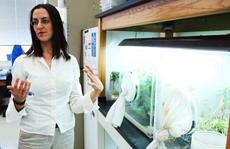In the ant world, males are primarily used for reproductive purposes. One farming species, however, has done away with males altogether.
The distinctly missing population was noticed in a tropical ant species that spreads from Central America to South America where the ants harvest fungi and clone their queen to reproduce.
“”We noticed that we didn’t find any males in our field studies, and then we looked in the literature there were no confirmed reports of males,”” said Anna Himler, a research associate in the UA center for insect science. “”So we were like, ‘this is weird, this is very weird.'””
Normally in ant colonies, when the queen ant is born, she only produces males and then normal sexual reproduction takes place. These queens were different.
“”These queens were only cranking out females, which was completely opposite of what any other unmated female ant queen would be able to do,”” Himler said. “”That goes against everything we know for most of the other species.””
In this species the queen ants don’t have the ability to produce males at all, she said. They are missing a reproductive organ that the male ants attach to.
“”It’s like a ghost of an outline of where it occurs, so it’s still there but apparently it’s degenerated,”” Himler said. “”So that indicates that they may have been asexual for a while and that was a huge hint that something unusual was going on with this species.””
Himler also mentioned that there are other asexual species in the world, but what makes this one different is that the queens are only producing queens and workers and it’s unlikely that they could ever revert back to sexual reproduction.
“”This species has evolved its own unusual mode of reproduction so we’ll see how long they’ll last,”” she said.
One advantage to having an all-female population is the ability to increase the population more rapidly because all of the females are producing only females, Himler said.
“”Asexual reproduction is more advantageous because your not wasting time or resources producing males and 100 percent of your offspring is reproductive since males don’t have the machinery to have babies,”” she said. “”It’s a huge numerical advantage.””
The disadvantage, however, is the lack of genetic variation in the species, causing disease and infection to be more of a threat.
“”If a disease or a parasite comes in to which one of those clones is susceptible then ‘boom’, they could all be wiped out,”” Himler sad. “”Without sexual reproduction mixing stuff up each generation, you don’t have the variability.””
Ulrich Mueller, a professor of integrative biology at the University of Texas at Austin, worked with Himler on the research of this species. He mentioned how ecologically successful this species is because it is so widespread.
“”Evolutionary theory predicts that asexual species should not be ecologically successful and that makes it unique,”” he said. “”The ants have figured out something that goes against expectations of evolutionary models.””
Himler said she hopes to continue researching these ants and doing field work on the species in their tropical locations.
“”There’s a lot of exciting research still to be done and a lot more we have to learn about this species,”” she said. “”It will hopefully teach us more about colony structure and sexual reproduction and how that’s successful.””









